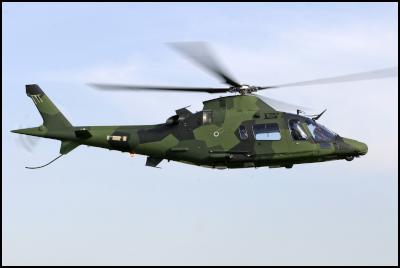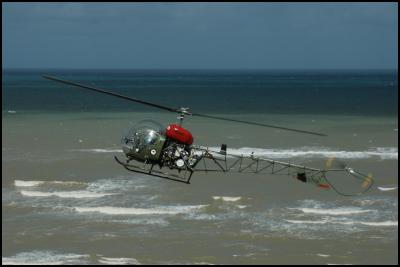New helicopters selected for NZ Defence Force
30 October 2007
Goff - New helicopters
selected for NZ Defence Force

Click for big version
Minister of Defence Phil Goff announced today that Cabinet has approved the start of contract negotiations with Agusta-Westland, the preferred tenderer for the supply of training-light utility helicopters to the New Zealand Defence Force.
“The negotiations for five Agusta-Westland A109LUHs and a flight simulator will commence shortly and I expect a contract to be signed in the first quarter of next year,” Phil Goff said.
“The helicopters should enter service with the Royal New Zealand Air Force in 2010.

Click for big version
“The purchase represents a new generation capability for the New Zealand Defence Force and in technology and capability is a quantum leap forward from the old Sioux training helicopter.
“In common with the Seasprite helicopter already in service and the eight new NH-90s on order for the RNZAF, the A109 is wheeled and capable of deployment from our navy vessels.
“The helicopter has the advanced technology necessary for training pilots going on to the Seasprite and NH-90 which the Sioux simply does not have.
“It flies faster and further, carries more people and can do a wide range of tasks, including with the Navy.
“As well as training, the A109 has light utility capabilities including air transport, search and rescue, aero-medical evacuation, disaster response and surveillance and counter terrorism support.
“It can work alongside the NH-90 or carry out tasks for which its size makes it more suited and at less expense than using the NH-90.
“It will also provide operational support for other government agencies, including Police, Customs, Department of Conservation, and Ministry of Fisheries.
“The Royal New Zealand Air Force is delighted with the decision. It represents another milestone in modernising the New Zealand Defence Force and providing it with capabilities needed for the Twenty First Century,’ Phil Goff said.
Announcement of selection of
preferred tenderer for the Training/Light Utility Helicopter
Project:
Questions and Answers
- What helicopter
has been selected?
o The Agusta-Westland A109LUH (Light
Utility Helicopter) has been selected to meet NZ’s
requirements for a Training/Light Utility Helicopter.
o
The A109LUH is a military variant of the A109 family of
helicopters that have served in a variety of civil and
military guises in over 80 countries around the world.
-
What sort of helicopter is the A109LUH?
o The A109LUH is
a lightweight, twin-engined helicopter with a modern
‘glass’ cockpit and a retractable wheeled undercarriage,
optimised for use in military training and light utility
tasks.
- Who makes the A109LUH?
o The A109LUH is made
by Agusta-Westland, which is based near Milan in Italy.
Agusta-Westland is one of the largest helicopter
manufacturers in the world having delivered over 4,500
helicopters to civil and military customers worldwide.
o
Agusta-Westland is also a partner in the production of the
NH90, which NZ is acquiring to replace the Iroquois.
-
How many are being purchased?
o Five A109LUH are being
purchased, along with a Flight Training Device to provide
simulation training for the pilots.
- How much will
they cost?
o The final detailed cost for the package will
be advised at the conclusion of the contract
negotiations.
- How big is the A109LUH?
o The A109LUH
has the following dimensions:
- Overall length (rotors
turning) - 12.94m
- Fuselage length – 11.45m
-
Rotor diameter – 10.83m
- Height - 3.4m
- Maximum
Take-Off Weight - 3175kg
- Empty weight – approximately
1670kg (depending on the equipment fitted for the task to be
undertaken)
- What is the performance of the A109LUH?
o
With a crew of three and a thirty minute fuel reserve the
A109LUH is capable of the following performance:
-
Maximum cruise speed - 285kph
- Maximum ferry range -
650km
- Maximum endurance - 3hrs 30mins
- Useful load
on the cargo hook - 600 kg
- Rescue winch capable of
lifting 270kg or two people
- Carrying one stretcher
patient
- How many people can it carry?
o The A109LUH
has two pilot seats and a maximum of six seats in the rear
cabin. The A109LUH will normally have a crew of two pilots
and one helicopter crewman, although this may vary depending
on the complexity of the task being undertaken.
- What
sort of tasks can it be used for?
o The A109LUH can be
used for pilot and helicopter crewman training as well as
for a wide variety of tasks involving the carriage of small
numbers of people and modest amounts of freight. In NZ
service it is intended to be used for conducting:
- Pilot
and helicopter crewman training for aircrew destined to fly
the NH90 and SH-2G Seasprite helicopters.
- Operational
support to the NH90 Medium Utility Helicopter during counter
terrorist operations.
- Light utility tasks involving the
carriage of up to six people or modest amounts of
freight.
- Operational support to other NZ government
agencies including NZ Police, NZ Customs Service, Department
of Conservation and Ministry of Fisheries.
- What
modifications are being made to the A109LUH to make it
suitable for NZ requirements?
o The A109LUH is being
fitted with radios that will make it compatible with the
communications capabilities of the NZDF, other military
partners and civil agencies.
- Who else uses the
A109LUH?
o Variants of the A109LUH are operated by South
Africa, Malaysia and Sweden.
o Other variants of the
A109 are flown by the United Kingdom, Australia, the US and
many other countries and companies around the world.
-
What makes the A109LUH suitable for training NZ crews?
o
The A109LUH has an advanced ‘glass’ cockpit with flight
performance, engine performance, moving map and other
instrumentation displayed on a number of multi-function
displays in the cockpit.
o The A109LUH also has an
advanced four-axis autopilot which, along with an advanced
flight management system and a full suite of instrument
flying and navigation systems, provides an excellent
introduction to the technology used in the NH90.
o The
A109LUH has a cabin, cargo hook and rescue winch that allow
helicopter crewman to be trained in the duties that they
will perform on the larger helicopters.
o The A109LUH is
suitable for introducing helicopter crews to Naval ships’
deck operations. All future helicopter crews will need to
be deck qualified so they can operate to and from the
Project PROTECTOR vessels currently being acquired.
- Why
do we need to replace the Sioux?
o The Sioux provides
neither the twin-engined, high performance experience, nor
does it have sufficiently advanced instrumentation, to
prepare pilots to undertake training on the very advanced
NH90, which is being purchased to replace the Iroquois.
o
The Sioux can not be used for training helicopter crewmen as
it does not have the cabin space, winch or hook necessary
and so the Iroquois is currently used. Upon retirement of
the Iroquois, the NH90 and Seasprite would be inappropriate
to use routinely for basic helicopter crewmen training.
-
Where will the A109s be based?
o The A109s will form part
of No 3 Squadron at RNZAF Base Ohakea.
- What other
helicopters were considered?
o There were only two
competitive responses to the Request for Tender, with the
other helicopter considered being the Eurocopter EC635, a
military variant of the civil EC135 helicopter.
- Why was
the A109LUH chosen?
o The A109LUH was chosen following a
competitive tender and evaluation process. It was assessed
to be the helicopter that best met the widest range of NZ
requirements.
- When will they arrive in New Zealand?
o
The final construction and delivery schedule will be
finalised during contract negotiations that will take place
over the coming months. However, it is anticipated that the
aircraft will enter service in 2010.
ENDS


 Gordon Campbell: On Why Leakers Are Essential To The Public Good
Gordon Campbell: On Why Leakers Are Essential To The Public Good Government: WorkSafe Makes Significant Shift To Rebalance Its Activities, Launches Road Cone Hotline
Government: WorkSafe Makes Significant Shift To Rebalance Its Activities, Launches Road Cone Hotline The Tree Council: Auckland Council Notifies Plan Change 113 Notable Trees
The Tree Council: Auckland Council Notifies Plan Change 113 Notable Trees ACT New Zealand: ACT New Zealand Celebration Brunch - David Seymour's First Speech as Deputy PM
ACT New Zealand: ACT New Zealand Celebration Brunch - David Seymour's First Speech as Deputy PM NZ Police: Operation Purple | Anti-Social Road User Gathering In Levin
NZ Police: Operation Purple | Anti-Social Road User Gathering In Levin New Zealand Defence Force: The Latest Update On The HMNZS Manawanui Response
New Zealand Defence Force: The Latest Update On The HMNZS Manawanui Response NZCTU: NZCTU Release Detailed Budget 2025 Analysis
NZCTU: NZCTU Release Detailed Budget 2025 Analysis


